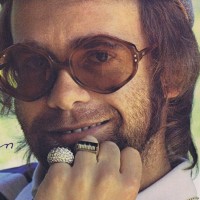Second acts are difficult; third acts, even more so. But what of a fourth? That’s Elton John, who’s already been a country-inflected singer-songwriter, Captain Fantastic and a mainstream pop star.
Perhaps the pathway to such thing is through deep self-examination, a return to your roots — at least that’s the message of the superlative Diving Board, due September 24, 2013 from Capitol Records. John, in the wake of an eye-opening, career-turning passion project with Leon Russell (2010’s Union), has rekindled the nervy, stripped-down verve of early projects like 11-17-70 (often appearing in a similar trio format) and the frayed old-west themes of Tumbleweed Connection (thanks, in no small part, to his partnering again with classic-era lyricist Bernie Taupin).
But for all of that, from the wonders of those small-group sounds (Raphael Saadiq is a warm presence on bass) to the smartly constructed flourishes from producer T Bone Burnett (Doyle Bramhall II guests on guitar, there are also a few tastefully done backing arrangements), Elton John remains at the center of The Diving Board — as a singer and, perhaps most importantly, at the keyboard.
As the ruminative themes of “Home Again” and “Voyeur” unfold with such a wistful grace, you realize once more what’s been missing for so long: Somewhere hidden behind the flashy duets, and the even flashier oversized glasses, the tributes to British royalty and the Disney cartoons, there must have been that same pianist, in search of a song. John has found it, over the course of an album that looks with determined focus on difficult themes like the passage of time, home goings, and the arc of history.
Along the way, The Diving Board emerges as a triumph of scale, too. John, with smart assists from Taupin and Burnett, establishes a narrative rhythm that can be both sprawling (“Oceans Away,” “Oscar Wilde Gets Out”) and, it seems, deeply personal (“Home Again,” the title track). Musically, it’s often interior (“My Quicksand”) but with just enough saloon-rattlingly raucous moments (“A Town Called Jubilee”) to avoid monotony.
Of course, John has been trying for this kind of comeback for some time, beginning at least with
2001’s Songs From The West Coast and continuing through projects like 2006’s The Captain and the Kid, presented as a sequel to 1975’s Captain Fantastic and the Brown Dirt Cowboy. But he’s never gotten it so utterly right before, never balanced things quite so well. It’s reminiscent of his best moments, without necessarily echoing them completely.
That, in the end, makes The Diving Board the album we’ve been hoping Elton John would make for years.
[amazon_enhanced asin=”B00DJZR4A2″ container=”” container_class=”” price=”All” background_color=”FFFFFF” link_color=”000000″ text_color=”0000FF” /] [amazon_enhanced asin=”B00108YG2Y” container=”” container_class=”” price=”All” background_color=”FFFFFF” link_color=”000000″ text_color=”0000FF” /] [amazon_enhanced asin=”B00857S822″ container=”” container_class=”” price=”All” background_color=”FFFFFF” link_color=”000000″ text_color=”0000FF” /] [amazon_enhanced asin=”B000001EGI” container=”” container_class=”” price=”All” background_color=”FFFFFF” link_color=”000000″ text_color=”0000FF” /] [amazon_enhanced asin=”B003TWP5JC” container=”” container_class=”” price=”All” background_color=”FFFFFF” link_color=”000000″ text_color=”0000FF” /]
- Nick DeRiso’s Best of 2015 (Rock + Pop): Death Cab for Cutie, Joe Jackson, Toto + Others - January 18, 2016
- Nick DeRiso’s Best of 2015 (Blues, Jazz + R&B): Boz Scaggs, Gavin Harrison, Alabama Shakes - January 10, 2016
- Nick DeRiso’s Best of 2015 (Reissues + Live): John Oates, Led Zeppelin, Yes, Faces + others - January 7, 2016



